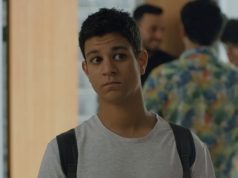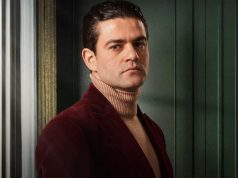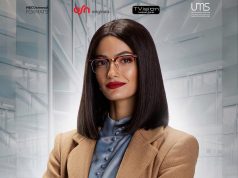This is an exclusive interview via Cairo to Sa7el magazine (part of Cairo West Publications).
Written by: Mariam Elhamy
Conducted by: Aliaa Elsherbini
Mohamed Farrag opens up to us about his childhood dreams, fears and the details of how hard his role in Taht El Saytara was to play. Read on to see how the star prepares for a part and how he recovers from tough roles, and more.
Cairo To Sa7el: Describe yourself in 3 words
MF: Thinker. I’m not a philosopher but I think a lot, neurotic and reckless sometimes, and I lean towards isolation.
Are you a risk taker at work?
Although I am not a patient person and I hate waiting for something, I am very patient when it comes to my work and I don’t take risks.
Tell us about your start in the film El Gamea…
I started acting 7 years before I got that role and I started acting professionally exactly 20 years ago. I started out at my university’s theater and a few jobs outside. I was always very invested in acting, it made me very happy. I didn’t care about how big or small a role was, I only cared about how good and important it was. I only take a role that I feel I can do something unique with that no one else can do; I like to have my own fingerprint in work and life in general. The magic of an actor is his distinctiveness.
 You seem very selective in your roles, but to what extent?
You seem very selective in your roles, but to what extent?
Sometimes I get unsuitable roles that I might like, so I try to talk my way through changing some of its aspects.
How do you get ready for a role?
Getting prepared for a role is much harder than the acting itself. Building a character and turning it from just words on paper to an actual visualization of a human with flesh and blood is a difficult process. I start imagining how the role would look on me when I act it out and I build on every aspect of the character brick by brick. I study its history and motivation, its upbringing, relationships, and significant events.
How did you get ready for the role of Aly El Rouby in Taht El Saytara?
Taht El Saytara was one of the best and hardest artistic experiences I’ve ever had. It was the first time I ever played an addict, everyone who played an addict in this story had to meet with and study 25-30 recovered cases. Some of these cases had quit recently and others had quit 20 years ago, with a huge amount of stories that are so dark and harsh for anyone to endure.
 Director Tamer Mohsen and scenarist Mariam Naoum along with Dr Nabil Elkot, one of the most significant figures of psychology and addiction in Egypt, helped us make it real because it’s not something you can just fake. Every scene was real and based on real events. Addiction is one of the hardest things a human could undergo. Drugs change your mind, they destroy it and all of your relationships as well, and that’s how you lose the meaning of life.
Director Tamer Mohsen and scenarist Mariam Naoum along with Dr Nabil Elkot, one of the most significant figures of psychology and addiction in Egypt, helped us make it real because it’s not something you can just fake. Every scene was real and based on real events. Addiction is one of the hardest things a human could undergo. Drugs change your mind, they destroy it and all of your relationships as well, and that’s how you lose the meaning of life.
I believe that all recovered addicts are heroes for going through all that and coming back to live a normal life. Playing Aly El Rouby and living all his happy, sad and dark moments was an unforgettable experience. This series always touches people deeply because everyone has either been or known someone who has been through this experience. It was a huge load on the cast, crew, director and everyone to execute it well.
Do you personally know anyone who has been through this? Has playing it affected you on a personal level?
Of course! It has definitely affected me deeply. A lot of people told me that I must have been an addict at some point in my life to be able to play such a role this way. Thank God I had never tried drugs, but the way I lived, experienced and surrendered every part of me to the role enabled me to play it this way. I am very proud of this period of my life and its effect on my career was huge. It was very real and powerful.
You like to take on challenging roles and once they’re done, you detach, how do you do that?
Not every role is that hard, some roles are easy, simple and don’t require a huge amount of effort and preparation.
I love traveling! I believe it has healing powers. I travel to detach from a complex role, it rejuvenates my system and enables me to get back feeling refreshed. I also love listening to music and doing yoga to clear my mind, or watch TV and play PlayStation.
 What are you most afraid of regarding acting?
What are you most afraid of regarding acting?
I love my job and I try to study and advance in it honestly. God rewards you for every hard and honest effort you make. I just pray that God doesn’t put me in a situation where I can’t make a decision or need someone’s help. I pray for the success and love that I deserve for the amount of effort I make.
Do you ever fear stagnation?
There’s no ceiling for what you can do, the most important thing is to succeed first and be aware that the more you succeed the more responsibility you’ll have and that’s what I fear. Whenever I succeed at something I’m afraid of what’s next or how hard it will be. I ask myself, “Am I ready for it? Will I be able to pass it?”. I have this constant fear of failing. I’m not afraid of the challenge or to confront my fears. My fear motivates me to work harder on myself and have more confidence. Confidence and risk are two faces of one coin. You have to have both.
How do you humble yourself?
I don’t think of myself as a star. I’m a bit shy and I dislike being fake or pretentious.
Were you ever affected by a negative comment?
When I try something new and people don’t like it I feel that they didn’t understand why I chose it. I understand that people have different tastes and I try to get into different types of roles and genres but I can never please everyone. Whenever I get negative comments I try to find if I can improve myself in that area.
Do you want to grow more as an actor?
My hunger and ambition only get more with time; this is hard because I’m always aiming to become better. I try to touch people, to make them laugh and cry and that’s the best thing about what I do.
 Is there a specific role you really want to play?
Is there a specific role you really want to play?
I love history, when I was younger I wished I could play a character from our Islamic history. I would love to do a biography to get into the details of a historical figure’s life and live it. For example, Dr Ali Moustafa Mosharafa, the Einstein of Arabs, a significant Egyptian scientist, Musab ibn Umair or Tariq ibn Ziyad.
Do you mind drastically changing how you look for a part?
I love roles that need me to change how I look or wear costumes. It’s very hard to get fat, thin or get a huge beard for a role and I believe that this affects an actor physically and mentally.
Have you ever thought about directing?
They say that every actor has an inner director, when I used to work in theater I got into a bit of directing but I found it to be very hard because you have to study every factor in the whole work. I feel I can’t attain that level of skill right now, but I write and direct in my own space of character.





